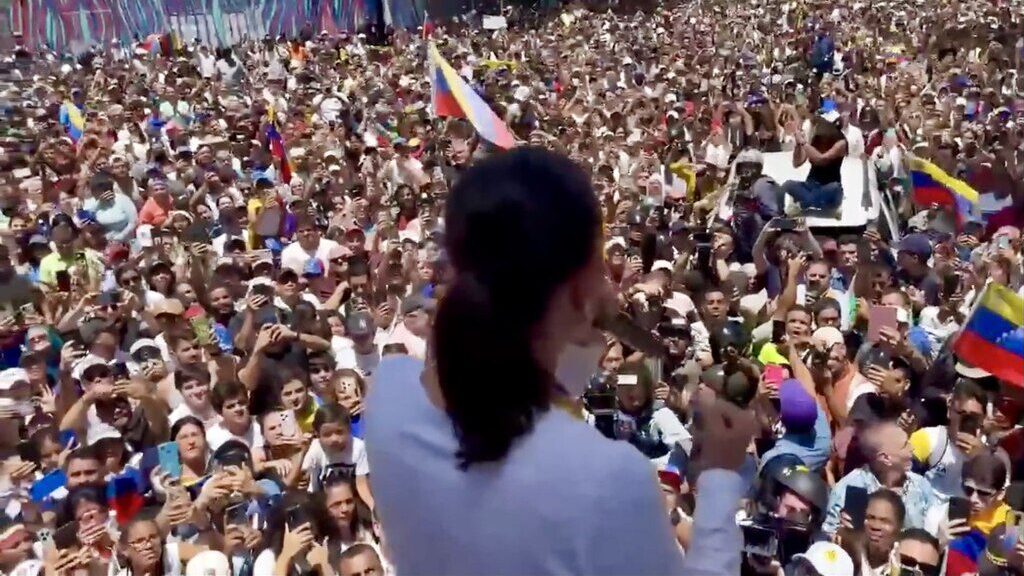
Protests against Nicolas Maduro, the self-proclaimed winner of the 2024 Venezuelan election.
Photo: Confidencial, CC BY 3.0, via Wikimedia Commons
The regime of Nicolas Maduro in Venezuela over the weekend attempted to close in on opposition leaders who have been sheltering inside the Argentine Embassy in Caracas since March.
On Saturday night, Venezuelan police surrounded the embassy and cut off traffic on the streets near the building in what the opponents say was another move to intimidate them.
Most of the six opposition leaders belong to Vente Venezuela, the political party founded by María Corina Machado, the prominent leader of Venezuela’s opposition. Machado galvanized the country around presidential candidate Edmundo González, widely recognized as Venezuela’s President-elect following the July elections. Maduro, however, has claimed he won the election, offering vastly different results from the ones collected from polling stations by the opposition. Maduro has yet to publicly show official results from polling stations as evidence of his victory.
The governments of the U.S. and Argentina, which have both recognized Gonzalez as the winner of the elections, decried the move.
The incident, which started Saturday night and continued to Sunday, occurred just hours after Machado called for a massive demonstration against Maduro on Dec. 1st.
“At 12:30 PM on November 24, the official residence of the Argentine Embassy in Caracas, protected by Brazil, is still under siege. Regime security officials remain outside. We are also still without electricity,” Pedro Urruchurtu Noselli, one of the Venezuelans protected in the embassy posted on X.
A las 5PM del 24 de noviembre, el servicio eléctrico fue restituido, pero se mantiene el asedio a la residencia oficial de la Embajada Argentina en Caracas, protegida por Brasil, por parte de funcionarios de seguridad del régimen, quienes continúan a las afueras del recinto.
— Pedro Urruchurtu Noselli (@Urruchurtu) November 24, 2024
The six Venezuelan opponents of Maduro have been under asylum protection in the Argentine embassy since the regime issued arrest warrants for them. The crackdown also saw Machado, then a presidential candidate for the united opposition party, disqualified from running. Gonzaléz, a retired diplomat, quietly replaced her but Machado, who has successfully escaped capture by the Maduro regime, remains the backbone of the opposition movement.
Brazil has been providing security for the Argentine Embassy since August, after Argentinian president Javier Milei refused to recognize Maduro as the winner of July’s elections, throwing his support behind the opposition. In response, Maduro ordered the expulsion of the embassy’s diplomats and personnel.
A month later, Venezuela revoked Brazil’s authorization to guard the embassy, alleging it had evidence of the use of the facilities “for the planning of terrorist activities and assassination attempts.”
Brazil and Argentina have rejected those accusations.
González is currently in Spain, also under asylum protection, but in a statement issued by Vente Venezuela, Machado reiterated the promise that he would return as President-elect to take possession of the presidency on January 10th, the date set in Venezuelan law.
“It is up to us to lead this process and get all the actors to do their part (…) We are planning a huge protest this December 1st. They ask us what we will do on January 10. No, January 10 is today. January 10 is a redemption movement for the liberation of Venezuela,” Machado stressed.
In her mission to have the opposition’s win in the elections recognized internationally, she has presented the results collected from the polling machines, legally recognized under Venezuelan law, to the parliaments of Argentina and Chile, which also recognized them.
